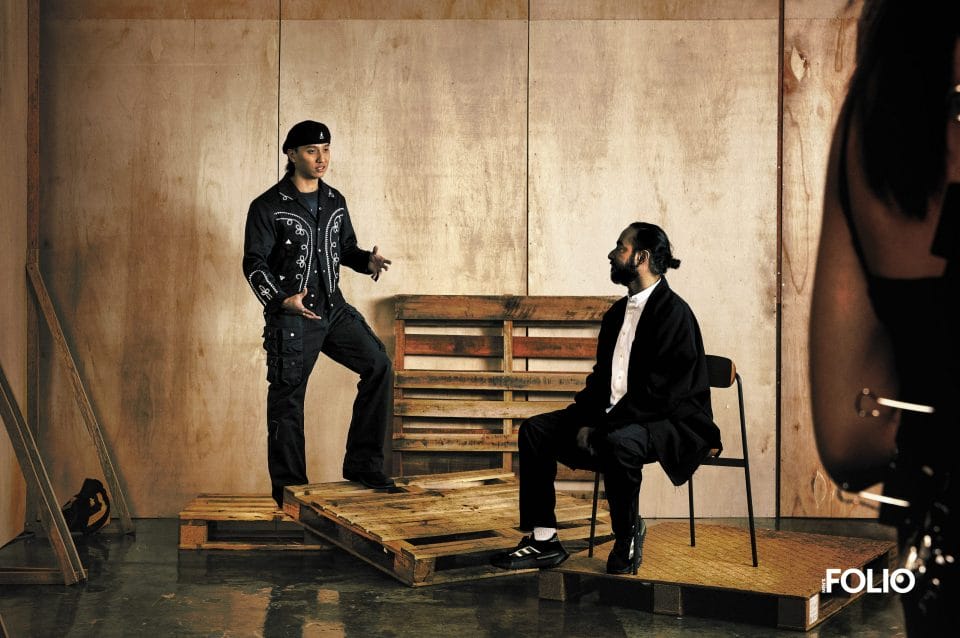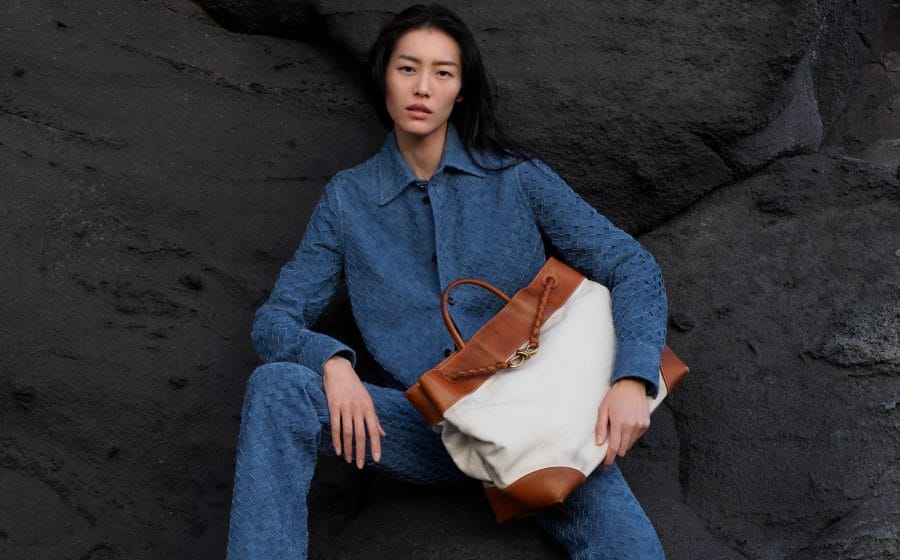 Two models, two photographers and two brand owners join a teacher and a student, and a stylist and her assistant in an exchange of beliefs on their roles in the fashion industry.
Two models, two photographers and two brand owners join a teacher and a student, and a stylist and her assistant in an exchange of beliefs on their roles in the fashion industry.
Pictured above from left to right: Lim Ting Yang, Founder, Devil’s Play Craft; Mandeep Chopra, Founder & CEO, Limited Edt
(On Yang) All clothing Yang’s own; (On Mandeep) Jacket, Depression | Sects Shop; Shirt, pants, socks, shoes, Mandeep’s own; NAU Sia chair, Cult Design Asia
Do you think that the Singapore market is enough? And will it ever be enough?
Yang: It could be. But it really depends on what is the end-goal for the brand. Is it wealth? Is it growth or development? Do you want to get your name out there? It’s things like that that have to be considered. If you’re just looking at the monetary side of it, it’s enough. But if you’re looking at a bigger audience to enjoy the designs you make, it’s not. You have to go international.
Mandeep: I agree. I mean, for me, if you asked me this question, maybe six, seven years ago, I would have told you it’s enough. But I think over time, when there’s competition, like, big global players coming to the local market, it made me realise that it’s not going to be enough. And in the grand scheme of things, we wouldn’t have been seen as important as just a Singapore store, right? So, we decided to kind of look at getting our name outside of Singapore, just for survival. The big become bigger and the small, slowly, will, you know… So I think we had to, just because Singapore is so small, and I think we’ve done all we can within our country. So I think it’s about time we embark on a journey to move out and fly our Singapore flag high wherever we go. Our first step is, end of November, we open a store in Delhi, India. So I think that’s something new and exciting for us.
Yang: So do you find that there’s a strength in having that a Singapore branding? I don’t think the local appeal actually constricts, like what some may think.
Mandeep: I think a lot of countries do have a lot of respect for Singapore. Yes, we might not be that cool fashion capital, like a Paris or New York, but to me, I like to look at the positives. It’s still a Southeast Asian hub, it still has a lot going for it. It’s an international city and things are always improving. So I really feel we are right up there.
Yang: And I think the local brands right now can be considered to be still, very small, but I think they’re slowly making their way up. Because I believe that the products speak for itself.
Mandeep: Maybe locals maybe don’t give local brands enough respect. I think that somehow over the years, you only get respect if you make it big overseas. Maybe it’s because we’re so international, right, that we’re exposed to so much. But I think everybody’s got to work together on the grassroots level on how we can champion local in whatever industry. At least in that, that’s going to give every chance then for any incoming new person to make his mark. Because if we still have that mentality of “overseas is better”, then everybody just starts on one rung below and has to fight even harder to get their name out there. I mean, you go through it every single day, right? Because you’re starting out, and you see that it’s not easy.
Yang: I think that it’s only human, for people to look up to the international big-players that are out there. They have a different court, essentially, especially in marketing. Like you know, they have network and opportunities to dress international celebrities. For teenagers looking to influential figures, who will look up to certain idols and what they’re wearing, this can make all the difference. But I think it boils down to the responsibility of brands to put out as much good products as they can.
Mandeep: Do you see things improving, like say, with the younger generation, are they more accepting of local?
Yang: Yeah, especially among Gen Zs. They’re are more receptive of local brands, which is a very good thing. I think it’s because of social media like TikTok.
Mandeep: Yeah. I think recently, the positives have been feeling more real, like a light at the end of the tunnel.
Yang: But I also feel like it’s like symbiotic. These communities actually can build more and more independent designers up, because of the support they bring. It can bring out the best and potential of each brand. We’ve recently started getting consigned at stores throughout Singapore. We are now stocked at Plop Apparels in Haji Lane. Jermaine [founder of Plop Apparels] supported us in the process, which was very heartwarming to see. Because she didn’t need to support us, and it would have been easier for her to not support us. But she did. And as Plop Apparels grew, Devil’s Play Craft grew too.
Mandeep: A hundred percent. Community is everything, right since our day one. If we didn’t have that, we wouldn’t be around today. You know, in the initial days — we started in 2003 — 20 years ago now, sneaker culture was small and not as mainstream as today. And in the Singapore’s context, as we all know, it’s not easy to be in retail, when you talk about rental costs, when you talk about manpower costs. And that’s why you don’t see that many local players anymore, versus say, 15-20 years ago. It’s a sad fact. So versus the big international players, local players have their work cut out for them. But I think what we really tried to achieve right from the start is building a community. Whether it was exhibitions in the early days or events now, it’s been nonstop. You know how tiring it can be. But it has to carry on. I see this as part of our role to keep on building that community. I think you’re experiencing it right now. You’re at Peninsula Shopping Center, which has good rental prices, and it’s still accessible space in town. And I think it’s a smart decision. And again, you know, if more and more independents like you can build a kind of a cluster then maybe it could become a destination space. Who knows? Did you start on your own or did you also have support when starting out?
Yang: I came out four years ago to actually start my own brand. And I used all my savings in the process. Back then it was kind of tough too, because at that point of time, my socials were not that strong yet. A lot of money had to be pumped in to marketing to bring the brand up. There were a lot of months that it was just paying rental and bills and stuff like that over and over again. And I think for close to two years, it has been slow. So I can say that definitely, you have to losing financially before you can gain. To actually build it to where it is today, and it’s slowly picking up, has been a worthy investment.
Mandeep: But that doesn’t mean you can’t do it, right? Again, if you have a good proposition, a good brand or a good product, you can make it work. But I think build gradually, I mean, nothing is built overnight. And, you know, you you’re seeing it right now. I think there’s value in being very prudent and careful to make the right decisions, and to grow slowly. I mean, yes, at the start, it’s going to be an investment. Right. But you never know, unless you try and you take the risk, who knows what the rewards are going to be? it’s a gradual thing you might at the start, but if you keep at it, I mean, I took a risk, and it was a much easier journey for me, but it has paid off. And it seems to be paying off for you as well.
Is it worth it?
Mandeep: It’s such an easy question for me. I mean, it’s all about passion. I had it right from the start. I love sports. I love sneakers, it’s something which intrigues me as I mature and get older. But the passion is there. So yeah, it’s it’s inbuilt in me. I would not recommend anybody to do this job, or to take all these risks, if they don’t have passion, because you’re gonna have to work extra hard to make it where you are. At the end of the day, it’s your legacy. Right? Something you can be so proud of.
Yang: It’s totally worth it. Like you said, the only thing that drives one person to actually do is the word passion. Yeah. And so without passion, I don’t think anyone can actually survive for long in this industry.
Photography Beng
Styling Manfred Lu
Text & Coordination Vanessa Grace Ng
Grooming & Hair Jenny Tan | Paletteinc. using M.A.C. Cosmetics and KEUNE Haircosmetics
Photography Assistant Alfred Phang
Styling Assistant & Production Coordination Lance Aeron
Once you’re done with this story, click here to catch up with our November 2023 issue.







